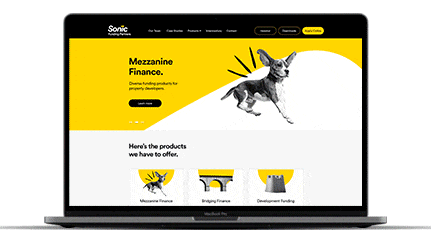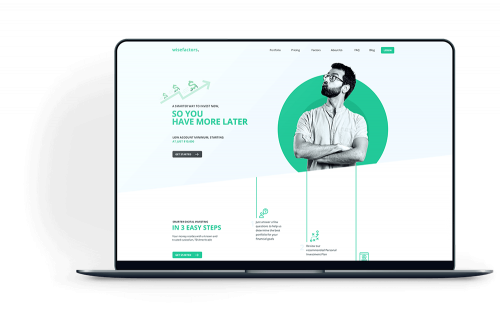Website Design in copyright: Crafting Custom Websites for Every Business
Website Design in copyright: Crafting Custom Websites for Every Business
Blog Article
Achieve Online Success With User-Friendly Internet Site Layout
In the increasingly affordable electronic landscape, the layout of a site can be an essential element in determining a service's success. Straightforward style not only enhances the overall user experience but likewise affects essential metrics such as conversion, involvement, and retention rates.
Relevance of Individual Experience
User experience (UX) plays a pivotal function in the success of an internet site, as it straight influences customer complete satisfaction and involvement. A favorable UX ensures that visitors can browse the website easily, accessibility information quickly, and full desired activities, such as signing or making a purchase up for a newsletter, without frustration.
In an electronic landscape where competitors is fierce, a website that prioritizes UX can dramatically enhance brand name commitment and retention. Customers are a lot more likely to return to a site that uses a seamless experience, producing a cycle of repeat sees and increased consumer life time worth. Furthermore, efficient UX design can minimize bounce rates, as individuals are much less likely to leave a site that fulfills their demands efficiently.
Additionally, search engines progressively take into consideration customer experience factors when ranking sites. Hence, spending in user experience is crucial for attaining long-lasting success in the digital industry.
Trick Concepts of User-Friendly Design
A successful straightforward layout hinges on a number of crucial principles that improve use and access. Firstly is simplicity; a clutter-free user interface makes it possible for users to browse effortlessly, decreasing cognitive tons. This concept highlights the relevance of clear and concise material, enabling customers to locate information quickly without unneeded interruptions.
Consistency is one more essential component. Regular usage of formats, typefaces, and shades promotes knowledge and constructs depend on. Customers should feel comfortable as they discover various sections of the web site, knowing that similar components represent related performances.
Reliable typography additionally plays a vital duty in user-friendly design. Understandable typefaces, suitable sizes, and ample spacing guarantee that content is easily legible across various tools. Integrating intuitive visual pecking orders helps users recognize crucial information and activities at a look.

Essential Functions for Navigating
Efficient navigation is critical for any kind of user-friendly site, as it directly affects the general user experience. A well-structured navigating system allows customers to find info rapidly and effectively, lowering disappointment and boosting interaction.
One important function is a intuitive and clear food selection that categorizes web content practically - website design copyright. This menu should be quickly obtainable from every page, typically placed at the top or on the side of the web site. Additionally, incorporating breadcrumb navigating assists users understand their location within the site power structure and makes it simpler to backtrack
Look performance is another essential element, allowing users to locate certain web content without filtering through multiple pages. This function should be prominently displayed and responsive to variations in input.
In addition, a mobile-responsive layout guarantees that navigating stays seamless across gadgets. As mobile usage remains to rise, menus should adapt to different screen sizes without compromising functionality.
Last but not least, aesthetic cues such as highlighting the energetic web page and making use of hover results can boost individual interaction. By incorporating these important attributes, site developers can create a navigational experience that is not only easy to use yet also motivates expedition and retention.
Accessibility Considerations
Ease of access considerations are indispensable to creating a straightforward website that satisfies all people, regardless of their capabilities or handicaps (website design copyright). Internet sites have to be designed to ensure that users with visual, auditory, cognitive, or electric motor problems can engage with material effectively. This starts with adherence to the Web Web Content Access Standards (WCAG), which give a structure for making digital web content more obtainable
Secret methods include the use of detailed alternative message for photos, making certain shade contrast ratios fulfill availability criteria, and giving inscriptions for multimedia components. Furthermore, the navigating must be instinctive, enabling users to tab go to my blog via links and interactive components easily. Implementing key-board navigation is crucial for those not able to use a computer mouse.
Moreover, clear and concise address language boosts understanding for individuals with cognitive restrictions. Types must be uncomplicated, with labels and directions that are understandable. Routine access screening, including customer feedback from people with handicaps, can help enhance and determine barriers use.
Determining Layout Success

User responses studies and functionality testing are important in assessing the performance of design aspects. These techniques permit developers to collect straight input from users, identifying discomfort factors and areas for enhancement. In addition, tracking heatmaps can expose where users click most frequently, aiding to inform format modifications and content prioritization.
Google Analytics can track user habits, revealing patterns that suggest whether the style is hindering the individual or assisting in journey. Ultimately, a successful internet site layout not just satisfies service goals however likewise promotes a pleasurable and seamless customer experience, driving engagement and loyalty over time.
Conclusion
To conclude, easy to use internet site layout is extremely important for achieving on the internet success. Prioritizing individual experience via simplicity, user-friendly navigating, and efficient responses devices not just improves user involvement and satisfaction yet likewise fosters brand loyalty. Including vital navigating attributes and accessibility considerations further guarantees that all users can properly interact with the site. Ultimately, determining layout success provides valuable understandings that assist constant improvement, strengthening a solid online presence in an affordable electronic landscape.
Web sites have to be created to ensure that users with visual, acoustic, cognitive, or look at this site motor problems can engage with material successfully.Gauging layout success entails examining how effectively a site fulfills its desired goals while giving a positive user experience. Google Analytics can track customer habits, exposing patterns that suggest whether the style is preventing the user or promoting trip. Eventually, a successful website layout not just fulfills service goals but additionally cultivates a enjoyable and smooth user experience, driving engagement and commitment over time. Prioritizing customer experience via simplicity, intuitive navigating, and effective feedback devices not only enhances customer interaction and satisfaction however additionally cultivates brand loyalty.
Report this page